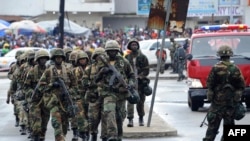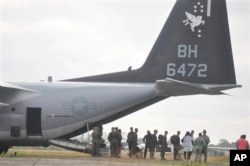The acting top Sergeant Major for Armed Forces of Liberia says he is concerned about terrorists in neighboring countries spilling into his homeland.
Speaking in an exclusive interview with VOA, Command Sgt. Maj. Karmoh Duke Freeman said the "worrisome" terrorism developments outside Liberia must be deterred with additional forces.
"We asked our partners to get involved immediately so that we'll curtail the situation," Freeman said, "because we need more than what we have at our border points."
The Liberian army of about 2,000 was built "from scratch," Freeman explained, after the Second Liberian Civil War ended in 2003.
The U.N. peacekeeping mission that helped develop Liberia's military formally withdrew earlier this year, potentially leaving the nation vulnerable to threats.
Freeman recommended routine military patrols around the border, along with recruitment expansions for military, police and immigration officers.
Liberia also receives support from the United States and African countries such as Sierra Leone, Nigeria, Ghana and Benin.
"We're there to help coach, teach, assist, advise and let them know we have their back. We're not going away. We're going to be there even in crisis," U.S. Army Maj. Gen. Michael Stone, the commanding general for the Michigan National Guard's military police, told a small group of reporters Friday at the Pentagon.
Michigan National Guard has partnered with Liberian forces since 2009, as part of the National Guard's State Partnership Program.
The state has sent over military police to conduct specialized training, as well as provided engineers for construction. National Guardsmen teach critical military skills like marksmanship, Stone said, but they also go a step further, providing Liberian forces with the knowledge of how to transport a unit to a range and run a range properly.
He added that Liberia's forces have come a long way since the Michigan-Liberia partnership began, growing from a force of a couple of hundred to a couple of thousand. Liberia's military's commander was not even a Liberian until 2014.
"They weren't professional enough, and there was such a fear because of the civil war, there was such a distrust … that they took a while to get a professional military where a Liberian officer could be vetted, trained, and have enough respect where the president was comfortable," Stone explained.
While Freeman describes the Liberian military as an "offspring" of the U.S. military, the Chinese military is spreading influence in the country via contributions in logistics support. The acting command sergeant major conceded that China was a logistics "partner" and educator, but denied the Liberian military was cooperating further.
"No, we don't work with the Chinese military," Freeman said. "We need the American military most."
Stone said the Chinese and the U.S. have very different approaches in Liberia, with the Chinese focusing on economic connections, while the Americans focus on personal connections.
"They'll [the Chinese] offer economic assistance to build something, but there's no sustainment model. There's no ongoing relationship," he said.





